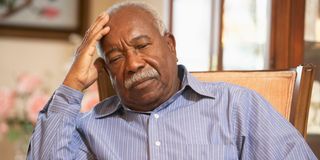
Loneliness is a big factor, especially for men, who tend to be less expressive, and should their wives die, it can be disheartening and could lead to shorter life expectancy.
Loss of a spouse is a life changing event. Dealing with grief is difficult, more so for retirees who not only mourn the loss of a husband or wife of many years, but a job too.
As grief is love that has nowhere to go, it can lead to frustration and depression, hitting hardest for men who did not have a community, or close friends, and for who society expects to mask emotions.
It is no secret that men struggle in retirement more than women. You most likely know of at least one man who died shortly after his wife passed away. It begs the question, why is it that women can live for decades after the husband passes away even without remarrying, but in less than five years, most widowers die?
Is it a question of loneliness, especially in retirement, or broken heart syndrome?
The 2022 Economic Survey by the Kenya National Bureau of Statistics (KNBS) shows the average Kenyan woman lives to age 66.5 years, while men live up to 60.6 years on average. Globally, more people around the world are likely to die before their 70th birthday, according to a new World Health Organisation (WHO) report, indicating a decline in life expectancy since 2012. The World Health Statistics 2025, which has data collated from 2019 up to the end of last year, shows that the Covid-19 pandemic crippled health systems and reduced life expectancy by 1.8 years. The healthy life expectancy, which is the number of years a person is expected to live with no medical issues, has also regressed to about 61.9 years.
John Brown Ndungú, a professor at St Paul’s University, lost his wife in 2019, just three years before his retirement.
“The first thing is, you start dealing with the trauma. You now have to orient yourself to a new way of life. The pain was enormous for me. It was a huge loss and I began isolating myself.”
While dealing with the loss of his wife, he opted for early retirement from the Anglican Diocese of Thika, and he faced a lot of stigma and loneliness. He even contemplated ending his life.
“To get myself out of that bad state, and to deal with the pain, I felt I had to isolate myself from the church and from my colleagues. Adjusting to life without my wife was also hard. I had to learn how to live in the house alone, how to live without going to work, and how to live without my regular salary,” he adds.

A majority of men say their wives were their best friends, but only a third of wives said their best friends were their husbands.
Ndungú lost so many friends and colleagues both from work and church.
“The most disappointing and frustrating thing was that I lost all my friends. I could no longer see them during my period of isolation.”
His conversations with workmates all revolved around workplace stuff, therefore, when his wife died and he retired, they had nothing in common. His phone rang no more and nobody showed up at his gate. Eventually, he travelled abroad to be with his children.
“I went abroad so that at least I could start creating a new life and avoid going crazy. I also started writing my autobiography,” he says, and adds,
“While writing the book, I was able to look back and remember how I began and grew in my career. That reminded me of how far I had come and how blessed I was. That helped me pull myself out of the rut,” said Ndung’u.
“My four children are all grown up. After the burial, everybody dispersed. I thought my children would call me more often, but they were also dealing with the loss of their mother,” recalls Ndung’u, who did not want to overburden his children, and so entered what he calls the stage of dissonance.
“Remember, that was the time of Covid-19, and movement was restricted. I started doing my exercises alone…I would walk, jog and read. I would find myself sometimes going into a very lonely state. I’m not a television watcher, but I found consolation in watching TV. I even joined Facebook.”
But that was not all.
“Then I started thinking perhaps I should become a politician, so that I can meet people. In all this, I was adjusting.”
He recalls driving to a park just to watch people and cars. He started golfing again and found a routine. He had something planned for each day of the week to keep busy. He even began going to church every Sunday after a four-year break. After adjusting to his new life and crafting a routine, he moved to the acceptance stage. He stopped waiting for friends to come to him, and began going to them. He started going out by himself, and became a regular church goer. And he stopped waiting for his phone to ring and started reaching out to people. For instance, he began calling his colleagues to golf sessions, and later he took to teaching again.
“I started looking at relationships, their meanings and their purpose. I talked to people who were divorced or who had lost their spouses. I started talking to single mothers. I started talking to single men and published a book called Love Made Uncooked in the African Christian Heart,” he explained.
In writing his book, he met so many people in different parts of the world who shared their stories of struggle and loss.
“By the time I published that book in November last year, I started exploring the idea of having a relationship, and at the beginning of March, I finally decided I would not live alone anymore, so I sought a girlfriend,” says Ndung’u, who got married again in December last year.
He says men do not talk to their fellow men, and society is quick to shun widowers.
“Men can talk to other men, but they don't talk to other women because they don't know how to live a life of their own. Men are pushed out not only by society, but also by family,” he said, and added,
“Men don't have that very strong attachment to their children, while women stay attached to the children even after the husband dies. The maternal relationship remains.”
While grieving, he recalls having a conversation with his children, who were closer to their late mother, on how he felt alone and how differently they mourned the loss.
“Men suffer a lot in silence. Even those who are divorced, there is a second stage, which is the stage of anger. People also process grief differently. There are people who isolate themselves, some start drinking, and others join support groups or talk to people, especially women. But most men suffer sometimes in silence.”
The death of a spouse during retirement not only impacts the surviving partner emotionally, but also financially.
A 2023 Danish medical survey published by PLOS, a nonprofit publisher of open-access science journals, showed that after losing a spouse, men were 70 per cent more likely to die than similarly aged men who did not lose a spouse, while women were 27 per cent more likely to die compared to women who were not widowed.
The survey also found that, "A majority of men say their wives were their best friends, but only a third of wives said their best friends were their husbands.” The report investigated the impact of spousal bereavement on medical expenditures and mortality in the general population, focusing on age and sex.
Chrisensia Ododa, a retirement coach and manager at Zamara, points out that the death of a spouse can impact one’s retirement income stream, and while this is the case, there are steps to updating financial records.
“Women generally run their homes, and when you return home to retire, men, who exceled in their jobs, do not do as well at home because their focus was at work,” said Ms Ododa.
“They find themselves having to take the reins and run home affairs, which women have been shielding them from, and should the wife die, it can be frustrating, so most of them remarry, and if they don’t, they struggle a lot.”
Widows are happier that widowers
Read: Coping with bereavement
The 2023 Danish medical survey referred to above, also found that, "A majority of men say their wives were their best friends, but only a third of wives said their best friends were their husbands.” The study also showed that in the event of a spouse’s death, widows have support from their various friend groups and family, unlike men. This is because women have closer, deeper relationships with friends and kin, as well as their adult children, compared to men. In some cases, the husband’s most intense and closest relationship is with the wife. Upon the demise of the wife, a man’s core relationship is severed, which can lead to loneliness, isolation, depression and even death.
Elizabeth Nyambura lost her husband back in 1996, when she was 35 years old.
“It’s now 29 years since he died and I have not remarried. When he left us, my first born child had just joined secondary school while the second born was in Standard Seven. My third born was very young and we had just registered her in a boarding school, while the fourth born was two years and eight months old and the youngest one and a half years old.”
Elizabeth, then a primary school teacher, painfully recalls life after her husband’s death.
“I didn't know he would leave us. My two youngest didn't enjoy the love of their father, he left when we really needed him,” she says.
She talks about how difficult it was to take her children through school and also provide for her day to day needs.
“Life has not been easy, but we made it,” she adds.
A report by Enwealth Financial Services and Strathmore School of Business shows that retirees’ highest financial concern is limited medical cover and reduced income.
Their top three pre-retirement expenditure was on children's fees, transport or investment plots and rent. In post-retirement, the main expenses were food, school fees and utilities.
Said one of the retirees,
“I contribute money to several welfare groups. We make contributions monthly, and when someone is bereaved or a member needs help, we give assistance.”
Says Ms Ododa, the retirement coach,
“It is important for both men and women, during retirement, to get into a group set up and engage in activities that are bigger than themselves, gel back into communities, get hobbies that include other people or get active in religious settings, or mentorship,” she says, pointing out that such activities will keep you grounded, and away from negative thoughts or drug abuse, which will erode your savings and affect your health in old age, especially for men.
“Loneliness is a big factor, especially for men. They are seldom expressive, so in the occasion of bereavement, an empty nest and with children they didn’t form strong relations with, it can be disheartening and could lead to a shorter life expectancy.”





